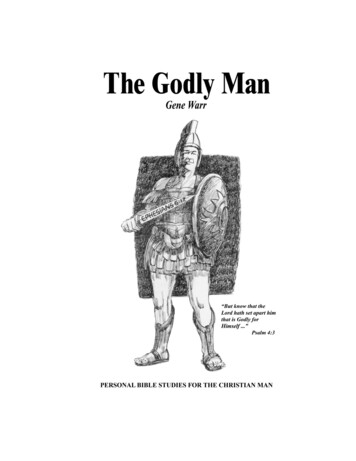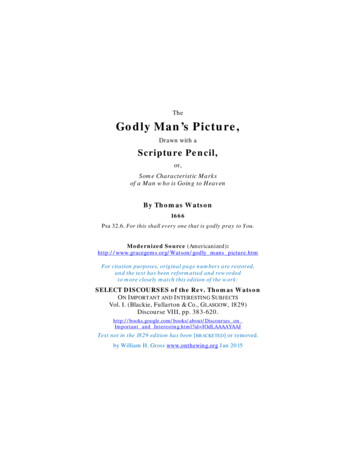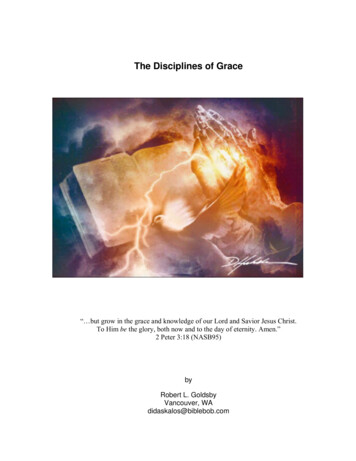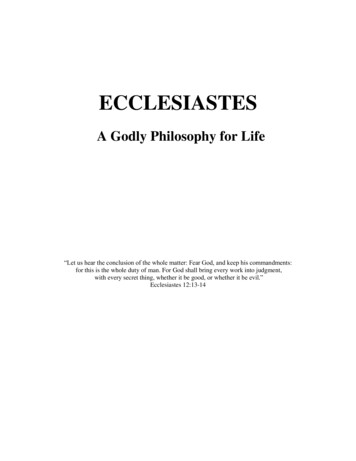
Transcription
with complete study guidedisciplinesof aGodlymanr. Kent Hughes
“Discipline is a subject about which the Scriptures say much—but contemporary authorshave been peculiarly silent. Kent Hughes fills a gaping void with this superb volume. You’llbe challenged and encouraged as you read. And if there is a spark of spiritual desire in yoursoul, this book will surely kindle it into a blazing passion for godly discipline.”—John MacArthur, pastor, Grace Community Church in Sun Valley,California, and author of Ashamed of the Gospel andThe Glory of Heaven“I enjoyed reading Disciplines of a Godly Man because it challenged my spirit. I highly recommend it to men who are not thin-skinned.”—Mike Singletary, former Chicago Bears middle linebacker andtwo-time NFL Defensive Player of the Year“This is a book for men who are eager to learn how to be more effective. It comes from thepen of one who has learned to serve as he has led and who is able to provide the reader withmany practical applications of eternal truths.”—C. William Pollard, Chairman and CEO, The Servicemaster Company“[This is] one of the best books I’ve read. . . . What an outstanding volume. . . . I guarantee:Digest this book and you will bid the blahs farewell.”—Charles R. Swindoll, President, Dallas Theological Seminary“In Disciplines of a Godly Man, Pastor Kent Hughes provides an inspiring and practicalguide for men who seek to reflect God’s glory in their lives. This book is a challenging textfor personal devotions as well as for assisting young followers of Christ to grow in their walkwith God.”—Lieutenant General Howard D. Graves, U.S. Army, retired; formersuperintendent United States Military Academy, West Point, New York“The best contemporary book of spiritual guidance I’ve read in a long time. Usually for thistype of food I have to look for a book that is at least 75 years old. This book is a surprisingexception. And it has the added advantage of being very relevant to specific needs in today’sworld.”—Ajith Fernando, National Director, Youth for Christ, Sri Lanka“I am so weary of the peculiar therapeutic atmosphere in which we live today that is scaredstiff to tell anybody to do anything or to warn anybody of dangerous consequences of failing to take responsibility for his or her life. . . . So to open [Disciplines of a Godly Man] andfind someone taking seriously the biblical call for ‘agonizing to enter the kingdom’ and striving like a gymnast to become godly and boxing and sweating like a champion to get victoryover sin is the most refreshing thing I could have set my eyes on. So thank you for yourcourage and for swimming against the stream. May the Lord cause your book to run andthe truth in it to be glorified and obeyed.”—John Piper, pastor of Bethlehem Baptist Church, Minneapolis, andauthor of Desiring God and God’s Passion for His Glory
Disciplinesof aGodlyManTenth Anniversary EditionRevised EditionR. Kent HughesC R O S S W AY B O O K SA PUBLISHING MINISTRY OFGOOD NEWS PUBLISHERSWHEATON, ILLINOIS
For my sonsBrian Thomas Hoch,James Jefferson Simpson,Richard Kent Hughes IIandWilliam Carey HughesDisciplines of a Godly Man.10th Anniversary Edition, Revised Edition, copyright 2001 by R. Kent Hughes.Original edition copyright 1991 by R. Kent Hughes.Published by Crossway Books, a publishing ministry ofGood News Publishers, 1300 Crescent Street, Wheaton, Illinois 60187.All rights reserved. No part of this publication may be reproduced, stored in a retrievalsystem or transmitted in any form by any means, electronic, mechanical, photocopy,recording or otherwise, without the prior permission of the publisher, except as providedby USA copyright law.Cover design: Cindy KipleFirst printing, original edition, 1991; first printing with study questions, 1995First printing, 10th anniversary edition, revised edition, 2001First printing, trade paperback edition, 2006Printed in the United States of AmericaUnless otherwise noted, all Bible quotations are taken from Holy Bible:New International Version, copyright 1978 by the New YorkInternational Bible Society. Used by permission of Zondervan Bible Publishers.
Table of ContentsAcknowledgmentsviiINTRODUCTION1 Discipline for Godliness11RELATIONSHIPS2 Discipline of Purity213 Discipline of Marriage334 Discipline of Fatherhood455 Discipline of Friendship57SOUL6 Discipline of Mind717 Discipline of Devotion838 Discipline of Prayer959 Discipline of Worship109CHARACTER10 Discipline of Integrity12311 Discipline of Tongue13512 Discipline of Work14713 Discipline of Perseverance157MINISTRY14 Discipline of Church16915 Discipline of Leadership17916 Discipline of Giving19117 Discipline of Witness20118 Discipline of Ministry211DISCIPLINE19 Grace of Discipline223
RESOURCESA The Bible on Audiocassette233B James and Deby Fellowes’s Witness to Their Faith235C Personal Reading Survey241D M’Cheyne’s Calendar for Daily Readings251E Through the Bible263F Topical Guide to Daily Devotional Bible Readingin a Year269G Selected Proverbs Regarding the Tongue275H Hymns for Personal Adoration and Praise279I Choruses and Scripture Songs for Personal Adorationand Praise281J Praise Psalms Especially Appropriate forPersonal Worship283Notes285Scripture Index297General Index301
AcknowledgmentsIWOULD LIKE to thank my secretary, Mrs. Sharon Fritz, for her care andpride of workmanship in typing the multiple revisions of the manuscript;Mr. Herbert Carlburg for weekly proofreading and many suggestedimprovements; Mr. George Grant for his expert editing though busy in far-offEngland; Mr. Ted Griffin, Managing Editor of Crossway Books, for his discerning eye which has made clear the incomprehensible and for the preparation of the study questions; and my wife, Barbara, who possesses the graciouswisdom to cut through the irrelevant and get to the heart of things with theperpetual James-like question, “So what difference does this make in the waywe live?”vii
Introduction
1DISCIPLINE FOR GODLINESSSOMETIME IN THE early summer before entering the seventh grade, Iwandered over from the baseball field and picked up a tennis racket forthe first time . . . and I was hooked! It was not long before I became a tenyear-old tennis bum. My passion for the sport became so intense, I would idlyhold a tennis ball and just sniff it. The pssst and the rubbery fragrance of opening a can of new tennis balls became intoxicating. The whop, whop and the lingering ring of a sweetly hit ball, especially in the quietness of early morning, wasto me symphonic. My memories of this and the summer which followed are ofblistering black tennis courts, hot feet, salty sweat, long drafts of delicious rubbery tepid water from an empty ball can, the short shadows of midday heading slowly toward the east, followed by the stadium “daylight” of the court’slights, and the ubiquitous eerie night bats dive-bombing our lobs.That fall I determined to become a tennis player. I spent my hoarded savings on one of those old beautifully laminated Davis Imperial tennis rackets— a treasure which I actually took to bed with me. I was disciplined! I playedevery day after school (except during basketball season) and every weekend.When spring came, I biked to the courts where the local high school team practiced and longingly watched until they finally gave in and let me play withthem. The next two summers I took lessons, played some tournaments, andpracticed about six to eight hours a day — coming home only when theyturned off the lights.And I became good. Good enough, in fact, that as a twelve-and-a-half-yearold, one-hundred-and-ten-pound freshman I was second man on the varsity tennis team of my large 3,000-student California high school.Not only did I play at a high level, I learned that personal discipline is theindispensable key for accomplishing anything in this life. I have since come to11
12INTRODUCTIONunderstand even more that it is, in fact, the mother and handmaiden of whatwe call genius.ExamplesThose who have watched Mike Singletary (perennial All-Pro, two-time NFLDefensive Player of the Year, and member of the Super Bowl XXV Dream Team)“play” — and have observed his wide-eyed intensity and his churning, crunching samurai hits — are usually surprised when they meet him. He is not animposing hulk. He is barely six feet tall and weighs, maybe, 220. Whence thegreatness? Discipline. Mike Singletary is as disciplined a student of the game asany who have ever played it. In his biography, Calling the Shots, he says that inwatching game films he will often run a single play fifty to sixty times, and thatit takes him three hours to watch half a football game, which is only twenty tothirty plays!1 Because he watches every player, because he mentally knows theopposition’s tendency — given the down, distance, hashmark, and time remaining, because he reads the opposition’s mind through their stances, he is oftenmoving toward the ball’s preplanned destination before the play develops. MikeSingletary’s legendary success is testimony to his remarkably disciplined life.We are accustomed to thinking of Ernest Hemingway as a boozy, undisciplined genius who got through a quart of whiskey a day for the last twenty yearsof his life but nevertheless had the muse upon him. He was indeed an alcoholicdriven by complex passions.2 But when it came to writing, he was thequintessence of discipline! His early writing was characterized by obsessive literary perfectionism as he labored to develop his economy of style, spendinghours polishing a sentence, or searching for the mot juste—the right word. It isa well-known fact that he rewrote the conclusion to his novel A Farewell toArms seventeen times in an effort to get it right. This is characteristic of greatwriters. Dylan Thomas made over two hundred handwritten(!) manuscript versions of his poem “Fern Hill.”3 Even toward the end, when Hemingway wasreaping the ravages of his lifestyle, while writing at his Finca Vigia in Cuba hedaily stood before an improvised desk in oversized loafers on yellow tiles from6:30 A.M. until noon every day, carefully marking his production for the dayon a chart. His average was only two pages — five hundred words.4 It was discipline, Ernest Hemingway’s massive literary discipline, which transformed theway his fellow Americans, and people throughout the English-speaking world,expressed themselves.Michelangelo’s, da Vinci’s, and Tintoretto’s multitudes of sketches, the
DISCIPLINE FOR GODLINESS13quantitative discipline of their work, prepared the way for the cosmic qualityof their work. We wonder at the anatomical perfection of a da Vinci painting.But we forget that Leonardo da Vinci on one occasion drew a thousand hands.5In the last century Matisse explained his own mastery, remarking that the difficulty with many who wanted to be artists is that they spend their time chasing models rather than painting them.6 Again the discipline factor!In our own time Winston Churchill has been rightly proclaimed the speakerof the century, and few who have heard his eloquent speeches would disagree.Still fewer would suspect he was anything but a “natural.” But the truth is,Churchill had a distracting lisp which made him the butt of many jokes andresulted in his inability to be spontaneous in public speaking. Yet he becamefamous for his speeches and his seemingly impromptu remarks.Actually, Churchill wrote everything out and practiced it! He even choreographed the pauses and pretended fumblings for the right phrase. The margins of his manuscripts carried notes anticipating the “cheers,” “hear, hears,”“prolonged cheering,” and even “standing ovation.” This done, he practicedendlessly in front of mirrors, fashioning his retorts and facial expressions. F. E.Smith said, “Winston has spent the best years of his life writing impromptuspeeches.”7 A natural? Perhaps. A naturally disciplined hard-working man!And so it goes, whatever the area of life.Thomas Edison came up with the incandescent light after a thousandfailures.Jascha Heifitz, the greatest violinist of this century, began playing the violin at the age of three and early began to practice four hours a day until his deathat age seventy-five — when he had long been the greatest in the world — some102,000 hours of practice. He no doubt gave his own “Hear, hear!” toPaderewski’s response to a woman’s fawning remarks about his genius:“Madame, before I was a genius, I was a drudge.”We will never get anywhere in life without discipline, be it in the arts,business, athletics, or academics. This is doubly so in spiritual matters. Inother areas we may be able to claim some innate advantage. An athlete maybe born with a strong body, a musician with perfect pitch, or an artist withan eye for perspective. But none of us can claim an innate spiritual advantage.In reality, we are all equally disadvantaged. None of us naturally seeks afterGod, none is inherently righteous, none instinctively does good (cf. Romans3:9-18). Therefore, as children of grace, our spiritual discipline is everything — everything!I repeat . . . discipline is everything!
14INTRODUCTIONPaul on DisciplineThis being so, the statement from Paul to Timothy regarding spiritual disciplinein 1 Timothy 4:7 — “train yourself to be godly” — takes on not only transcending importance, but personal urgency. There are other passages whichteach discipline, but this is the great classic text of Scripture. The word “train”comes from the word gumnos, which means “naked” and is the word fromwhich we derive our English word gymnasium. In traditional Greek athleticcontests, the participants competed without clothing, so as not to be encumbered. Therefore, the word “train” originally carried the literal meaning, “toexercise naked.”8 By New Testament times it referred to exercise and trainingin general. But even then it was, and is, a word with the smell of the gym in it— the sweat of a good workout. “Gymnasticize (exercise, work out, train) yourself for the purpose of godliness” conveys the feel of what Paul is saying.Spiritual SweatIn a word, he is calling for some spiritual sweat! Just as the athletes discardedeverything and competed gumnos — free from everything that could possiblyburden them — so we must get rid of every encumbrance, every association,habit, and tendency which impedes godliness. If we are to excel, we must stripourselves to a lean, spiritual nakedness. The writer of Hebrews explains it likethis: “Therefore, since we are surrounded by such a great cloud of witnesses,let us throw off everything that hinders and the sin that so easily entangles, andlet us run with perseverance the race marked out for us” (Hebrews 12:1). Men,we will never get anywhere spiritually without a conscious divestment of thethings that are holding us back. What things are weighing you down? The callto discipline demands that you throw it off. Are you man enough?The call to train ourselves for godliness also suggests directing all of ourenergy toward godliness. Paul pictures this elsewhere: “Everyone who competesin the games goes into strict training. . . . Therefore I do not run like a man running aimlessly; I do not fight like a man beating the air. No, I beat my body andmake it my slave” (1 Corinthians 9:25-27). Intense, energetic sweat! We shouldsingularly note that a sentence later in the context of Paul’s command to “trainyourself to be godly,” he comments on the command and the intervening words,saying “for this we labor and strive.” “Labor” means “strenuous toil,” and“strive” is the Greek word from which we get “agonize.” Toil and agony arecalled for if one is to be godly.
DISCIPLINE FOR GODLINESS15When one seriously trains, he willingly undergoes hours of discipline andeven pain so as to win the prize — running 10,000 miles to run 100 yards atone’s best. The successful Christian life is a sweaty affair!No manliness no maturity! No discipline no discipleship! No sweat nosainthood!Why the Disciplines?Understanding this, we now get down to the reasons for this book, which aretwo.First, in today’s world and Church, disciplined Christian lives are the exception, not the rule. This goes for men, women, and the professional clergy. Wecannot excuse ourselves by saying this has always been the case. It has not! Asto why this is so, several common-sense reasons could be tendered, such as poorteaching or individual sloth. But underlying much of the conscious rejection ofspiritual discipline is the fear of legalism. For many, spiritual discipline meansputting oneself back under the Law with a series of Draconian rules which noone can live up to — and which spawn frustration and spiritual death.But nothing could be farther from the truth if you understand what discipline and legalism are. The difference is one of motivation: legalism is self-centered; discipline is God-centered. The legalistic heart says, “I will do this thingto gain merit with God.” The disciplined heart says, “I will do this thing becauseI love God and want to please Him.” There is an infinite difference between themotivation of legalism and discipline! Paul knew this implicitly and fought thelegalists bare-knuckled all the way across Asia Minor, never giving an inch. Andnow he shouts to us, “Train [discipline] yourself to be godly”! If we confuselegalism and discipline, we do so to our soul’s peril.The second reason for this book is that men are so much less spirituallyinclined and spiritually disciplined than women. A recent study conductedin the United Methodist Church reveals that 85 percent of the subscribers tothat denomination’s premier devotional booklet, The Upper Room, arewomen. Moreover, the same statistics hold true for their other devotionalbooklet, Alive Now, which has a 75 percent female readership.9 This is corroborated by the fact that the overwhelming majority of books purchased inChristian bookstores are bought by women.10 Women simply read moreChristian literature!It is also true that far more women are concerned about the spiritual welfare of their mates than vice versa. The magazine Today’s Christian Woman
16INTRODUCTIONhas found that articles focusing on the spiritual development of husbands havegarnered the highest readership.11 All this is sustained by hard statistics. AGallup Poll conducted in June 1990 revealed that 71 percent of the women surveyed believed religion can answer today’s problems, while only 55 percent ofthe men agreed.12 The typical church service has 59 percent females versus 41percent male attenders.13 Furthermore, married women who attend churchwithout their husbands outnumber by four to one the men attending withouttheir wives.14Why? Certainly the pervasive American male credo of self-sufficiency andindividualism contributes. Some of this may also be due to the male avoidanceof anything relational (which, of course, Christianity is!). But we do not concede that women are simply more spiritual by nature. The parade of greatsaints (male and female) down through the centuries, as well as spirituallyexemplary men in some of our churches today, clearly refutes this idea. But thefact remains that men today need far more help in building spiritual disciplinethan women.Men, what I am going to say in this book comes straight from the heartand my long study of God’s Word — man to man. In writing this I have imagined my own grown sons sitting across the table, coffee cups in hand, as I tryto impart to them what I think about the essential disciplines of godliness. Thisbook is eminently user-friendly. The Church in America needs real men, and weare the men!Cosmic CallWe cannot overemphasize the importance of this call to spiritual discipline.Listen to Paul again from 1 Timothy 4:7, 8: “Train yourself to be godly. Forphysical training is of some value, but godliness has value for all things, holding promise for both the present life and the life to come.”Whether or not we have disciplined ourselves will make a huge differencein this life. We are all members of one another, and we are each either elevatedor depressed by the inner lives of one another. Some of us affect others like ajoyous tide, lifting them upward, but some of us are like undertows to the Bodyof Christ. If you are married, the presence or lack of spiritual discipline can serveto sanctify or damn your children and grandchildren. Spiritual discipline, therefore, holds huge promise for this present life.As for “the life to come,” spiritual discipline builds the enduring architecture of one’s soul on the foundation of Christ — gold, silver, and precious stones
DISCIPLINE FOR GODLINESS17which will survive the fires of judgment and remain a monument to Christ foreternity (cf. 1 Corinthians 3:10-15).Some may minimize the importance of spiritual discipline now, but no onewill then! “[G]odliness has value for all things”! The disciplined Christian givesand gets the best of both worlds — the world now and the world to come.The word discipline may raise the feeling of stultifying constraint in someminds — suggesting a claustrophobic, restricted life. Nothing could be fartherfrom the truth! The obsessive, almost manic discipline of Mike Singletary liberates him to play like a wild man on the football field. Hemingway’s angst overthe right word freed him to leave a mark on the English language second onlyto Shakespeare. The billion sketches of the Renaissance greats set Michelangelofree to create the skies of the Sistine Chapel. Churchill’s painstaking preparation freed him to give great “impromptu” speeches and brilliant ripostes. Thedisciplined drudgery of the musical greats released their genius. And, brothersin Christ, spiritual discipline frees us from the gravity of this present age andallows us to soar with the saints and angels.Do we have the sweat in us? Will we enter the gymnasium of divine discipline? Will we strip away the things that hold us back? Will we discipline ourselves through the power of the Holy Spirit?I invite you into God’s Gym in the following chapters — to some sanctifying sweat — to some pain and great gain.God is looking for a few good men!Food for ThoughtWhat is spiritual discipline, and why is it so important? What usually getsin our way (see Romans 3:9-18)? What can a lack of spiritual discipline do toyour life?Reflect on 1 Timothy 4:7, 8 (“train yourself to be godly”). What is the literal meaning of “train” here? Practically, step by step, what does this mean youshould do?What does Hebrews 12:1 say about this? What things are holding you backin your walk with God? Why are you hanging on to them?Is there a cost to spiritual discipline? Check out 1 Corinthians 9:25-27.What could greater discipline cost you? Are you prepared to pay the price? Whyor why not?
18INTRODUCTION“No manliness no maturity! No discipline no discipleship! No sweat nosainthood!” True or not true? How do you feel, deep inside, about this challenge?How does spiritual discipline differ from legalism? Which do you mostoften practice? Is a change needed? If so, how can you bring this about?Application/ResponseWhat did God speak to you about most specifically, most powerfully in thischapter? Talk to Him about it right now!Think About It!Can we really become disciplined men of God — a spiritual Mike Singletaryor Winston Churchill? Aren’t we just setting ourselves up for defeat? Answerthis in your own words, without using evangelical clichés.
Relationships
2DISCIPLINE OF PURITYONE NEED TURN on the television for only a few minutes to feel theheat of the oppressive sensuality of our day. Most of the oppression iscrude. A boring trip around the TV channels at midday invariablyreveals at least one couple wrapped in bed sheets and much sensual monotony.But the heat has become increasingly artful, especially if its purpose is to sell.The camera focuses close up, in black and white, on an intense, lusting maleface, over which is superimposed an amber flame, which then becomes a glowing bottle of Calvin Klein’s Obsession as the face intones its desire. Newer spotsfeature subtle cinematic images with prose from D. H. Lawrence — “. . . toknow him, to gather him in . . .” — and Flaubert’s Madame Bovary as she wanders around her illicit lover’s bedroom.1 The sticky steam of sensuality penetrates everything in our world!But even with all this, many sensualists want more. Professor David A. J.Richard of New York University Law School, who advocates freedom for hardcore pornography, argues that “pornography can be seen as the unique mediumof sexuality, a ‘pornotopia’ — a view of sensual delight in the erotic celebrationof the body, a concept of easy freedom without consequences, a fantasy of timeless repetitive indulgence.”2 Pornotopia? Now there’s a word! It sounds like anew section of Disneyland. Autotopia . . . Pornotopia . . . Fantasyland.“Absurd!” we think — and it is — but sadly, Richard’s arguments are actuallybeing given serious weight today. It is no wonder we live in a culture that sweatssensuality from its pores!And the Church has not escaped, for many in today’s Church have wiltedunder the heat. Recently Leadership Magazine commissioned a poll of a thousand pastors. The pastors indicated that 12 percent of them had committedadultery while in the ministry — one out of eight pastors! — and 23 percent21
22RELATIONSHIPShad done something they considered sexually inappropriate.3 ChristianityToday surveyed a thousand of its subscribers who were not pastors and foundthe figure to be nearly double, with 23 percent saying they had had extramarital intercourse and 45 percent indicating they had done something they themselves deemed sexually inappropriate.4 One in four Christian men are unfaithful,and nearly one half have behaved unbecomingly! Shocking statistics! Especiallywhen we remember that Christianity Today readers tend to be college-educatedchurch leaders, elders, deacons, Sunday school superintendents, and teachers.If this is so for the Church’s leadership, how much more for the average member of the congregation? Only God knows!This leads us to an inescapable conclusion: The contemporary evangelicalChurch, broadly considered, is “Corinthian” to the core. It is being stewed inthe molten juices of its own sensuality so that it is: No wonder the Church has lost its grip on holiness. No wonder it is so slow to discipline its members. No wonder it is dismissed by the world as irrelevant. No wonder so many of its children reject it. No wonder it has lost its power in many places — and that Islam and otherfalse religions are making so many converts.Sensuality is easily the biggest obstacle to godliness among men today andis wreaking havoc in the Church. Godliness and sensuality are mutually exclusive, and those in the grasp of sensuality can never rise to godliness while in itssweaty grip. If we are to “discipline [ourselves] for the purpose of godliness” (1Timothy 4:7, NASB), we must begin with the discipline of purity. There has tobe some holy heat, some holy sweat!Lessons from a Fallen KingWhere are we to turn for help? The most instructive example in all of God’sWord is the experience of King David as it is told in 2 Samuel 11.Life at the TopAs the account begins, David is at the summit of his brilliant career — as highas any man in Biblical history. From childhood he had been a passionate loverof God and possessed of an immense integrity of soul, as attested by Samuel’swords when he anointed him as king: “Man looks at the outward appearance,
DISCIPLINE OF PURITY23but the Lord looks at the heart” (1 Samuel 16:7). God liked what He saw. Godliked David’s heart!His was a brave heart, as was evidenced when he met Goliath and returnedthe giant’s fearsome rhetoric with some spine-tingling words of his own — thencharged full-speed into battle, nailing Goliath right between the headlights (1Samuel 17:45-49).David had an archetypal sanguine personality brimming with joy, enthusiasm, and confidence and overflowing with irresistible charisma. He was thepoet — the sweet Psalmist of Israel — so in touch with God and himself thathis Psalms pluck the heartstrings of man even today. Under his leadership allIsrael had been united. David hardly seemed a candidate for moral disaster. Butthe king was vulnerable, for there were definite flaws in his conduct which lefthim open to tragedy.DesensitizationSecond Samuel 5, which records David’s initial assumption of power inJerusalem, mentions almost as an aside that “after he left Hebron, David tookmore concubines and wives in Jerusalem” (v. 13). We must note, and note well,that David’s taking additional wives was sin! Deuteronomy 17, which set downthe standards for Hebrew kings, commanded that they refrain from threethings: 1) acquiring many horses, 2) taking many wives, and 3) accumulatingmuch silver and gold (cf. vv. 14-17). David did fine on one and three, but hecompletely failed on number two by willfully collecting a considerable harem.We must understand that a progressive desensitization to sin and a consequent inner descent from holiness had taken root in David’s life. David’s collection of wives, though it was “legal” and not considered adultery in theculture of the day, was nevertheless sin. King David’s sensual indulgencedesensitized him to God’s holy call in his life, as well as to the danger and consequences of falling. In short, David’s embrace of socially permitted sensuality desensitized him to God’s call and made him easy prey for the fatal sin ofhis life.Men, it is the “legal” sensualities, the culturally acceptable indulgences,which will take us down. The long hours of indiscriminate TV watching, whichis not only culturally cachet but is expected of the American male, is a massiveculprit of desensitization. The expected male talk — double entendre, coarsehumor, laughter at things which ought to make us blush — is another deadlyagent. Acceptable sensualities have insidiously softened Christian men, as statis-
24RELATIONSHIPStics
Digest this book and you will bid the blahs farewell.” —Charles R. Swindoll, President, Dallas Theological Seminary “In Disciplines of a Godly Man, Pastor Kent Hughes provides an inspiring and practical guide for men who seek to reflect God’s glory in their lives. This book is a challenging text










